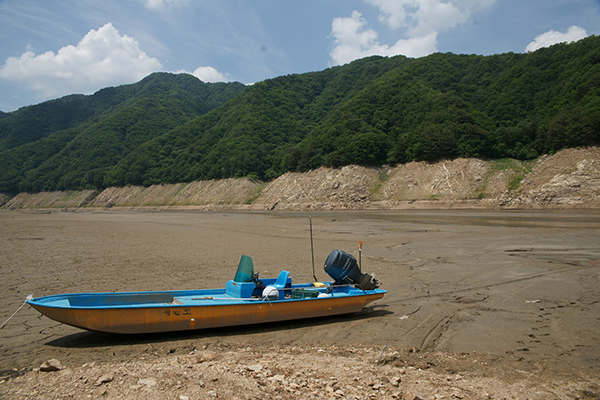
Climate change impacts
UD faculty to lead international conference on impacts of extreme climate events
8:13 a.m., April 5, 2016--An international conference on the impacts of extreme climate events on aquatic biogeochemical cycles and fluxes will be convened by a group that includes two faculty members in the University of Delaware’s Department of Plant and Soil Sciences from Jan. 22-27, 2017, in San Juan, Puerto Rico.
The special meeting -- which is being organized in part by Shreeram Inamdar, professor of plant and soil sciences, and Thomas Parr, a postdoctoral scientist in the department -- has been selected as an American Geophysical Union (AGU) Chapman Conference.
Research Stories
Chronic wounds
Prof. Heck's legacy
Chapman conferences are highly selective conferences that push the boundaries of science and advance current understanding. Other conveners include Bill McDowell of the University of New Hampshire, Elizabeth Minor of the University of Minnesota, James Shanley of the U.S. Geological Survey (USGS) in Vermont, and Ji-Hyung Park of the Ewha Womans University in South Korea.
The conference will bring together leading scientists from across the world to address the most challenging questions and concerns associated with extreme climate events -- tropical storms and hurricanes, thunderstorms, heat waves, droughts, ice storms, snowstorms and/or northeasters, unexpected frost/freeze events, and tornadoes -- and how they impact aquatic ecosystems worldwide.
A total of 100-125 selected scientists are expected to attend the meeting.
Inamdar was recently awarded a $50,000 grant from the United States Department of Agriculture (USDA) for the meeting, funds that will be valuable for organization and travel support for the attendees. Additional funding is being sought.
Extreme climate events, or ECEs, have increased and are projected to further increase in intensity and frequency across the United States and the world.
Scientists and policy makers are extremely interested in determining how these events might impact streams, rivers, lakes, estuaries, bays and other vulnerable and valuable ecosystems. The recent problems that Hurricanes Irene (2011) and Sandy (2012) posed to the Mid-Atlantic and parts of coastal New Jersey and New York are excellent examples of these challenges.
Heat waves are also on the increase worldwide. July 2015 was the warmest month on record for the Earth dating back to January 1880 and the year 2015 was the warmest on record by a clear margin, surpassing the previous record set just the year before.
According to the United Nations World Meteorological Organization (WMO), globally, 15 of the 16 warmest years on record have occurred since 2000. In the United States, December 2015 was both the warmest and the wettest on record. These trends suggest that extreme climate events might be the new normal.
This meeting will be unique because participants will synthesize the current state of knowledge, develop conceptual and mechanistic models that will advance the science, explore new directions for experiments, measurements and modeling studies, and determine how science can help shape mitigation, management and restoration strategies for aquatic systems subject to ECEs.
Specifically, this special conference will focus on water-driven exports of carbon, nitrogen and phosphorus in particulate, dissolved and gaseous forms from terrestrial to aquatic ecosystems.
It will also focus on changes in biogeochemical cycles of carbon, nitrogen and phosphorus in aquatic ecosystems during and following ECEs and changes in aquatic ecosystem functions and services as a result of extreme events.
The meeting will address several key questions such as how extreme weather events are defined, what has been learned from past extreme events, what the long-term consequences of extreme weather events are on aquatic ecosystems and how extreme events influence the export, transport and cycling (or transformation) of carbon, nitrogen and phosphorus along the aquatic continuum extending from the source/headwaters to the sea.
The meeting will also address how extreme weather events alter ecosystem structure, functions and services, examine the coupled impact of land use (current and legacy) and extreme events, and consider if existing land management strategies and restoration paradigms work for extreme weather events.
These questions will be addressed through invited talks, presentations, discussions, and synthesis papers that will be generated from the meeting.
A field visit midway through the meeting will be planned for the Luquillo Critical Zone Observatory located in Luquillo Mountains of northeastern Puerto Rico, about 35 kilometers east of the conference location in San Juan. The intent is to visit the sites impacted by hurricanes Hugo (1989) and Georges (1998) and learn about the changes in watershed and aquatic ecosystems following these extreme events.
Participants will also visit watershed and stream sites currently being studied by the critical zone observatory and investigate the sampling and monitoring strategies in place and how well these strategies are poised to capture the impact of any future hurricanes or other ECEs.
Student participation at the meeting will be especially encouraged and faculty and students from the University of Delaware who are interested in attending are encouraged to contact Inamdar at Inamdar@udel.edu for further information. Travel funds may be available on a selected basis.
Additional information will soon be available on the conference pages on the AGU Chapman Conference website. Abstract submissions will be accepted and registration will be held this fall.








